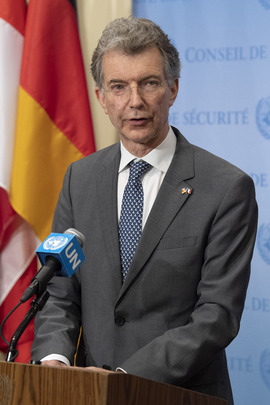On April 4th, UN Secretary-General Antonio Guterres went to Tripoli, Libya to speak with the country’s senior government officials about the implementation plan of a “Libyan-led and Libyan-owned political solution” to the years of political turmoil and human rights crises. This plan would hopefully materialize at the Libyan National Conference, scheduled to take place later on in 2019. Guterres’ presence there on Thursday was to promote, on behalf of the UN, “the welfare of the Libyan people, the peace in the country, and the possibility to live in a normal democracy and to take profit of the enormous wealth of the country to benefit its citizens.”
However, on April 5th, Guterres flew to Benghazi, Libya’s second city, with UN envoy Ghassan Salamé in an attempt to prevent military action by Commander Khalifa Haftar, head of the Libyan National Army (LNA) and American citizen, against the current UN-recognized government of Fayez al-Sarraj. It does not appear that Guterres is confident that diplomatic and political solutions in the country are now possible after his meeting with Haftar: “I leave Libya with a heavy heart and [am] deeply concerned. I still hope it is possible to avoid a bloody confrontation in and around Tripoli,” he tweeted. How did a flip in attitudes and diplomatic proceedings happen so quickly?
German Ambassador to the UN Christoph Heusgen and President of the Security Council for April, spoke to the press later on Friday, stating: “The members of the Security Council express deep concern for the military activity in Tripoli, which risks Libyan stability and prospects for UN mediation and a concrete political solution to the crisis.” Heusgen assured the press that UN representatives are taking a rigid position against Haftar’s military activity: “They called on LNA forces to halt all military movements… They express their intention to hold those…who are responsible for further conflict accountable.” In his final statement on the cohesion of UN Security Council member states, he said, “They reiterated their full support for the Secretary-General and… called on all parties to resume dialogue and deliver on their commitments to engage constructively with the UN political process.”

However, in a response to La Voce’s question about whether Heusgen believes that Haftar would do all of this with no backing at all from any other country, the German Ambassador replied, in a truly diplomatic manner, “I don’t want to and cannot speculate with regard to Haftar.” Who’s backing Haftar in his bold move?
In the past, sources speculated that France, along with Russia and Egypt, was one of the major backers of General Haftar. Now, things seem different, and the French Ambassador to the UN, Francois Delattre, delivered those remarks to the press before the closed-door UNSC briefing with Salamé took place, stating: “We fully support the [Secretary-General] and Ghassan Salamé’s efforts and those of the United Nations more broadly to put an end to the current deadlock and to initiate a strong political momentum. We therefore call on all Libyan actors to work constructively with the UN and to participate in the national conference planned for April 14-16. This conference should be an important milestone in the political process, which is the only way out of the crisis.”
An appearance of unity toward the crisis was also displayed by the G7 Foreign Ministers meeting in France, who released a statement on western Libya’s current situation:
“We, the Foreign Ministers of Canada, France, Germany, Italy, Japan, the United Kingdom and the United States of America, and the EU High Representative, gathered in Saint-Malo on April 5th, express our deepest concern about military operations near Tripoli, Libya. We urge all involved parties to immediately halt all military activity and movements toward Tripoli, which are hindering prospects for the UN-led political process, putting civilians in danger, and prolonging the suffering of the Libyan people.
We firmly believe that there is no military solution to the Libyan conflict. We strongly oppose any military action in Libya. Any Libyan actor or faction that precipitates further civil conflict are harming innocent people and standing in the way of the peace that Libyans deserve.
We reiterate our full and united support to the United Nations Secretary General Antonio Guterres and Special Representative of the Secretary General Ghassan Salamé as the UN seeks to help Libyans overcome Libya’s political stalemate, and help Libyans chart a path toward credible and peaceful elections as soon as possible, as agreed by the Libyan parties in Paris in May 2018 and in Palermo in November 2018. We further call on all Libyans to constructively support the UN led process and the international community to demonstrate full unity and cohesion towards the shared objective of the sustainable stabilisation of Libya.”

So, it seems from the public statements as though the Western countries are finally collaborating cohesively now, after years of what looked like competition with one another for the upper hand in affairs related to the final stabilization of Libya (the country does have one of the richest supplies of natural resources in the world, after all). But is it perhaps too late for this united front? Haftar ordered his troops to march to Tripoli even with the UN Secretary-General literally at his door, and it currently appears as though Libya will enter another bloody civil war. There’s still the question of who has supported him in this decision, as it is very difficult to imagine that Haftar could have accomplished it alone, but also of how there could have been this oversight amongst UN representatives regarding his intentions and then sending Guterres to Libya, in the middle of hell–did they really not see this coming?












